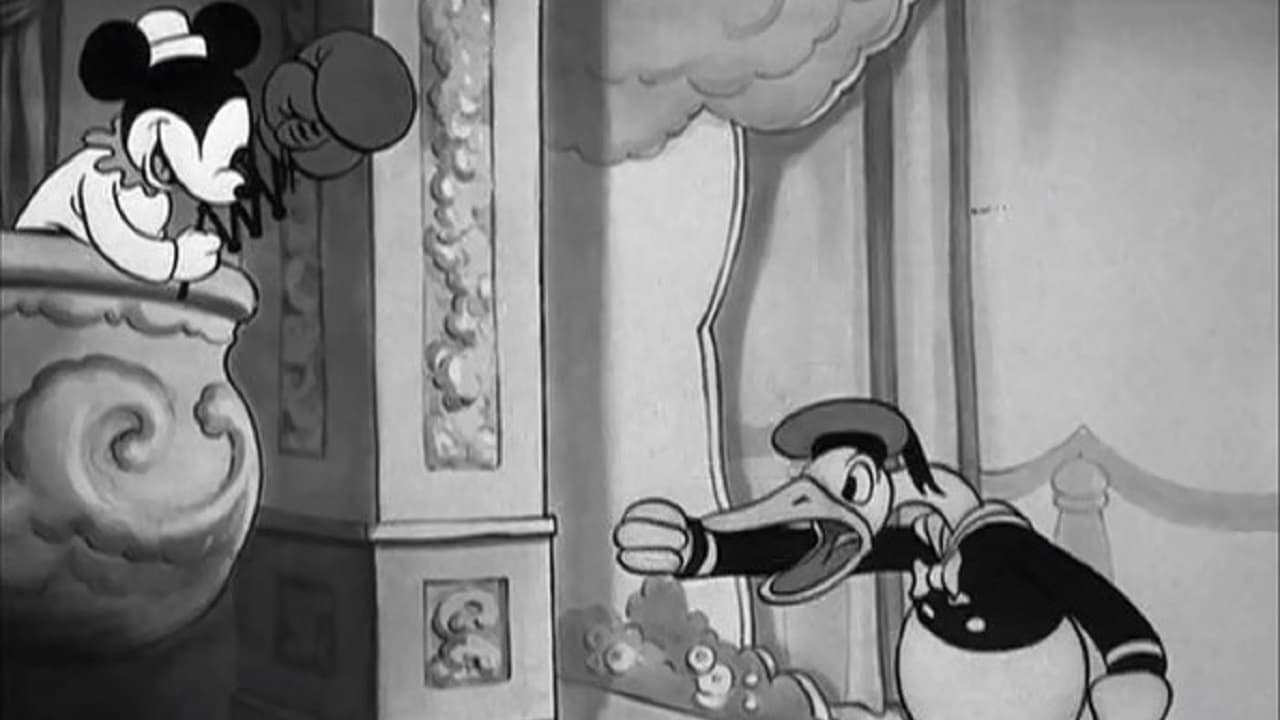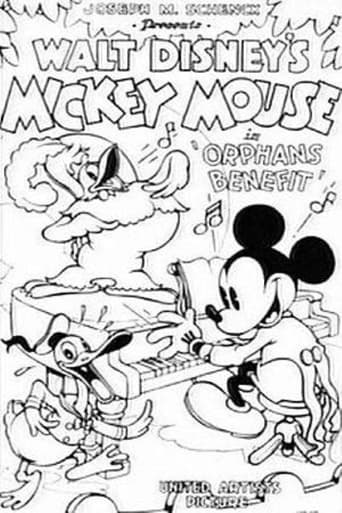



Load of rubbish!!
Too much about the plot just didn't add up, the writing was bad, some of the scenes were cringey and awkward,
View Morea film so unique, intoxicating and bizarre that it not only demands another viewing, but is also forgivable as a satirical comedy where the jokes eventually take the back seat.
View MoreThe plot isn't so bad, but the pace of storytelling is too slow which makes people bored. Certain moments are so obvious and unnecessary for the main plot. I would've fast-forwarded those moments if it was an online streaming. The ending looks like implying a sequel, not sure if this movie will get one
View MoreThis is the original black and white 1934 cartoon (there is a color remake of the 1940s). Here, Mickey and his friends put on a benefit show for orphans. The plot line for this story sounds touching and meaningful enough, but the orphans themselves were actually pretty mischievous with no redeeming qualities. They torment poor Donald Duck, who tries to recite nursery rhymes for them. Donald got the brunt of all the mean jokes and gags from the orphans.While the animation of this stark black and white short is very nice and seeing Mickey team up with Donald Duck and Clara Cluck is a treat, the overall cartoon is not very entertaining or funny.Grade D--
View MoreThis is a black and white Mickey Mouse cartoon done by the Disney studio. There will be spoilers ahead:In 1934, Disney did this short, Orphan's Benefit, in black and white. They then basically redid the short as "Orphans' Benefit" in 1941, this time in color. The shorts are both fascinating, though I like the earlier black and white just slightly more because the use of shadow is better.The two shorts aren't exactly the same. The character designs are a bit different, particularly with regard to Donald Duck, who actually steals the short. Various characters also have a bit more clothing (Goofy has a shirt in 1941, Mickey has a shirt and a tie and so on). There's generally a little more detail in 1941.There's a very quick caricature of Jimmy Durante by Donald in the 1931 version and there are changes in direction for some of the bits of animation. The orphans, as always, are thoroughly obnoxious in both, with Donald getting the brunt of their "charming" behavior This short is available on the Disney Treasures Mickey Mouse In Black and White, Volume Two. Most recommended.
View MoreNow I do very much enjoy Orphans' Benefit in colour, the colours are beautiful on the eyes, but I did and still do find the character designs on the stiff side. Although Donald and Goofy do look somewhat different with Donald's head I think elongated and Goofy doesn't have a chin the character designs generally are more fluid. The black and white animation is crisp and clear, and the music is wonderful, the Lucia Di Lammermoor sextet being clucked was a great touch but the best music for me was actually in the classic acrobatic dance between Clarabelle, Horace and Goofy. The story is well paced and never dull but for me it all feels on the routine side. The gags fare better, there are a few that are either over-familiar or some may not get(it took me ages to get the Jimmy Durante gag), but most of them are spot on, with the best being the Little Boy Blue gag between Donald and the Orphans. Of the cartoon, the least effective character was Mickey, who apart from introducing the acts and accompanying in the Lucia Di Lammermoor scene plays secondary to Donald's hilarious frustration and the cute yet bratty orphans. Even the acrobatic dance was more memorable than Mickey in all honesty. Just for the record, I like Mickey, but he is bland when sidelined. Overall though, this is a very good cartoon. 8/10 Bethany Cox
View MoreThis cartoon is something of a milestone in the realm of Disney character history: it marks the first occasion when Mickey Mouse and Donald Duck appeared together in the same film. The irritable duck in a sailor suit who appears in Orphan's Benefit doesn't quite match the one we expect, however. In this, his third short, Donald has the elongated bill and smaller head that marked his earliest appearances, before the Disney crew arrived at his now-classic design. But the familiar short-fuse attitude is in place, and quite ready to detonate. What's most striking about this short is how quickly and completely Donald overshadows the beloved but comparatively bland Mickey, who, in this very first teaming, is instantly reduced to the role of straight man.Like many cartoons of the period this one is built around a variety show, a loosely organized Vaudeville-style program that allows the writers plenty of leeway for gags without any need for a plot. This particular event is, like the title says, a benefit for the local orphans' home, but it's not a fund raiser as such; it's a show put on strictly for the orphans themselves, which means that the audience is made up entirely of young, identical mice, seemingly hundreds of them, all looking like miniaturized versions of Mickey. Here, as in other shorts of the era, the Disney technicians proved to be especially good at animating amazingly detailed crowd scenes involving lots of complicated action in all corners of the frame, which is one reason they were the envy of animators at every other cartoon studio in the world.Back to the show: the kids in the house are rowdy at first, but they manage to settle down and enjoy the entertainment for the most part. They watch politely as Clarabelle Cow performs a ballet, accompanied by Horace Horsecollar and Goofy, the latter two clad in loincloths. And they listen attentively as a rotund hen named Clara Cluck cackles her way through a song. But they seem to take an immediate dislike to Donald Duck, or perhaps it's more accurate to say that they soon take pleasure in tormenting him. Donald's intended contribution is the recitation of poetry. His first selection, "Mary Had a Little Lamb," comes off well enough, but he pushes his luck when he launches into "Little Boy Blue." This selection provokes a kid in the crowd to react with a Bronx cheer, so of course Donald loses his temper and has to be dragged offstage by the dreaded Hook. He returns periodically throughout the program and tries to finish his recital, but every time he reaches the line about blowing that horn the kids razz him -- and, eventually, hurl bricks, eggs, and other objects.Comic hostility between the rowdy kids and the increasingly exasperated duck is what drives this cartoon, and makes it enjoyable to watch. Along the way there's a show biz joke that some viewers might miss: early on, when Donald is first thrown off stride by a sassy boy in the crowd, his nose suddenly turns bulbous as he exclaims: "Am I mortified! Am I mortified!" in the style of Jimmy Durante. The gag doesn't quite register because there's no attempt to make the duck sound like Durante; he still sounds like Donald Duck, so the point is obscured. But that's a minor quibble. Orphan's Benefit is an amusing cartoon that would make a nice lead-in to any good '30s feature film. Toss in a newsreel and a comedy short and you've got a full evening's entertainment.
View More